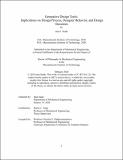| dc.contributor.advisor | Yang, Maria C. | |
| dc.contributor.author | Saadi, Jana I. | |
| dc.date.accessioned | 2024-03-13T13:24:53Z | |
| dc.date.available | 2024-03-13T13:24:53Z | |
| dc.date.issued | 2024-02 | |
| dc.date.submitted | 2024-02-15T21:16:13.537Z | |
| dc.identifier.uri | https://hdl.handle.net/1721.1/153664 | |
| dc.description.abstract | Generative design tools, empowered by recent advancements in computational algorithms, offer the opportunity for human designers and design tools to collaborate in new, more advanced modes throughout various stages of the product design process to facilitate the creation of higher performing and more complex products. Much of the research focuses on the technical development and application of these tools, while less attention has been paid to how generative design tools are used from the designer’s perspective. Three main contributions of this dissertation include a development of a generative design process, observations of the implications of the use of generative design tools, and an understanding of how designers balance multiple objectives throughout a generative design process. A grounded theory approach based on the experiences of designers was first used to develop a generative design process. Six in-depth interviews were conducted with experienced designers from different disciplines who use commercial generative design tools in their work, detailing the design processes they followed. A qualitative-based coding and analysis of the interviews was used to generate 161 coded themes describing the design process. Through these themes, a provisional process diagram for generative design and its uses in the early-stage design process is proposed to outline explicit and implicit stages of the design process. Several implications of the use of generative design tools on the design process and designer behavior were developed through additional analysis of the interviews. The early 5 stages of defining tool inputs bring about a constraint-driven process in which designers focus on the abstraction of the design problem. Designers will iterate through the inputs to improve both quantitative and qualitative metrics, such as engineering performance and product styling. This learning-through-iteration allows designers to gain a thorough understanding of the design problem and solution space. This can bring about creative applications of generative design tools in early-stage design to provide guidance for traditionally designed products. It was observed that generative design tools primarily allow for quantitative inputs to the tool while qualitative metrics, in particular aesthetics, are considered indirectly by designers. To explore this further, controlled lab experiments were conducted to understand how designers balance quantitative and qualitative objectives while using generative design tools. Thirty-four participants completed two design tasks (with and without generative design tools) with the same qualitative and quantitative objectives. Counterintuitively, designs created in the task without generative design tools had a statistically higher quantitative performance than those created with generative design tools. On the other hand, the designs produced with generative design tools displayed a greater aesthetic diversity and expanded a larger portion of the objective space. Participants also expressed the ability to focus on the qualitative objectives by delegating the quantitative objective to the generative design tool. This showcases the potential for generative design tools to assist in the design process and leveraging the expertise of both the human designer and the generative design tool to allow for greater consideration of various objectives throughout the design process. | |
| dc.publisher | Massachusetts Institute of Technology | |
| dc.rights | Attribution-ShareAlike 4.0 International (CC BY-SA 4.0) | |
| dc.rights | Copyright retained by author(s) | |
| dc.rights.uri | https://creativecommons.org/licenses/by-sa/4.0/ | |
| dc.title | Generative Design Tools: Implications on Design Process, Designer Behavior, and Design Outcomes | |
| dc.type | Thesis | |
| dc.description.degree | Ph.D. | |
| dc.contributor.department | Massachusetts Institute of Technology. Department of Mechanical Engineering | |
| mit.thesis.degree | Doctoral | |
| thesis.degree.name | Doctor of Philosophy | |
